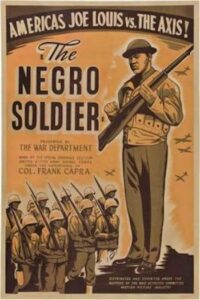
The Negro Soldier
*The release of the film The Negro Soldier is celebrated on this date in 1944. The United States Army created this documentary film and used the film as propaganda to convince Black Americans to enlist in the Army and fight in the war.
During World War II, while the U.S. Army was officially racially segregated, they turned to the African American workforce. Social scientists of the time argued that the mass media were the best way to instill a message within people and push them to act towards a common goal. The Army started with Frank Capra to head the effort to create morale films designed to build enthusiasm for war purposes. The U.S. Department of War decided to film a documentary on African American soldiers after the Under Secretary of War learned of the American South's Jim Crow laws from his advisor, Truman Gibson.
In March 1942, Capra began brainstorming The Negro Soldier. He researched what was acceptable and unacceptable in creating a cinematic depiction of Blacks. The findings listed cautions to avoid stereotypes of Negroes; also avoid strong images of racial identity ('play down some colored soldiers' appearance's and omit 'Lincoln, emancipation, or any race leaders or friends of the Negro’)." With these in mind, the writer Marc Connelly created the first script for The Negro Soldier, with the same sympathetic treatment for Negro themes that he had used in his earlier work, The Green Pastures.
Connelly's first script was too dramatic for the Army's tastes. A second draft of the movie was rejected because the Army wanted more of a documentary. Ultimately, Carlton Moss wrote the movie, and Stuart Heisler became director. Both Moss and Heisler worked very well together. Most people regarded the film very highly, some going as far as to say that The Negro Soldier was "one of the finest things that ever happened to America." Due to both high reviews and great cinematography, The Negro Soldier proved to be a breakout film influencing army members and civilians of all races.
In 2011, it was preserved in the National Film Registry of the Library of Congress. In December 2011, The Negro Soldier was deemed "culturally, historically, or aesthetically significant" by the United States Library of Congress and selected for preservation in the National Film Registry. The Registry said the film "showcased the contributions of Blacks to American society and their heroism in the nation's wars, portraying them in a dignified, realistic, and far less stereotypical manner than in previous Hollywood films."
To Become an Animator
To Become a Media Producer or Director